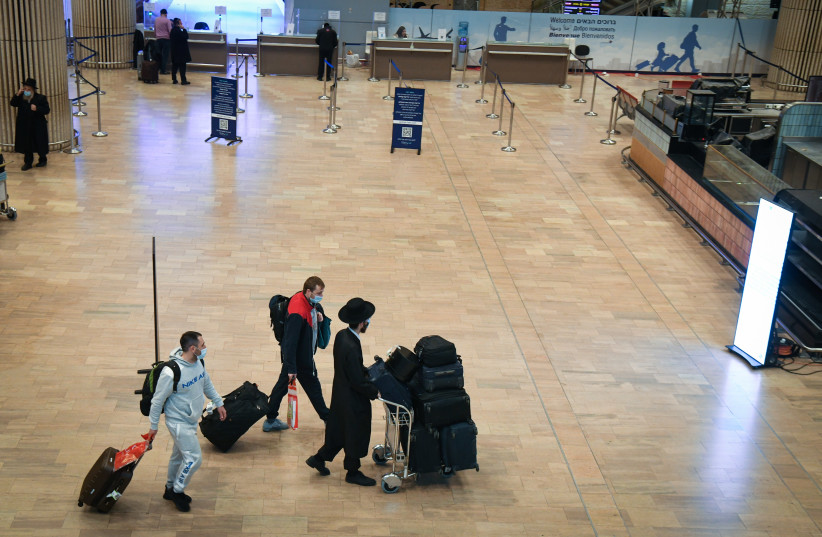The pandemic has not only been the cause of illness and mortality of millions of people around the world, it has also shaken our way of life, disrupted our economy, limited our movement locally and globally and has accelerated deep societal change.
In times of emergency, I believe we need to heed the opinions of doctors and public health experts as well as the decisions of the political leaders, who act with due deliberation to protect the public and the country.
That being said, my psychologist and educator friends speak about the trauma that our children have undergone in dealing with coronavirus, and we adults have taken to contemplating the essence and quality of our lives in a new way.
I would like to draw attention to another matter that is influenced by the pandemic: The relationship between Israel and Diaspora Jews. As a rabbi who works with families and organizations to develop and deepen the Jewish identity of Jews in Israel and abroad, I feel an obligation to issue a word of caution regarding the collateral damage of this pandemic – the acceleration of the growing divide between the identities of Israeli Jews and Diaspora Jews.
Israel has closed its borders to every non-Israeli citizen a few times in the last two years. In addition to the severe blow to the tourism industry, tens of thousands of Jews canceled their visits to Israel – synagogue groups, delegations, educational programs, youth trips, families marking bar/bat mitzvot and more. In addition, around half of Israel’s Jewish citizens have family abroad.

At the same time, as Israel forbids the entrance of citizens’ family members and a draconian committee approves very few exceptions, the state does provide an exception to the Miss Universe beauty pageant and now to the Birthright program.
These choices for exceptions raise questions about the state’s intentions. Closing the border to non-Israeli Jews defines the relationship between us as unessential.
The relationship between Israel and the Jewish people throughout the world is essential to the state and to the entire nation. Israel’s founders proclaimed in the Declaration of Independence: “Our call goes out to the Jewish people all over the world to rally to our side in the task of immigration and development and to stand by us in the great struggle for the fulfillment of the dream of generations – the redemption of Israel.”
Jews came to help and support from abroad in times of need and come consistently to explore their heritage. Israelis who visit abroad strengthen their Jewish identity through contact with communities there.
And when Jews from abroad visit Israel, the meeting with Israeli Judaism incredibly strengthens their Jewish identity and their connection with Israel. Our meetings are critical for Jewish identity and for the continuing sense of peoplehood.
Until now, Israel has promised world Jewry to be the country for all Jews. It was understood: Israel is here for you – if you decide to make aliyah and become citizens or if you decide to take part in another way in this great project.
If Israel decides to close its borders to the rest of the Jewish people, it needs to take into consideration the damage that is caused to the cohesion of our nation, to the Jewish identity of our people and to our sense of unity.
The relationship with Diaspora Jewry is not that of the tourism industry, it is a relationship essential to the identity and unity of the people in Israel and around the world.
If the state closes its borders now, it needs to allocate human resources to allow more exceptions for families to visit. It needs to establish a conversation with the leadership of the Jewish communities and organizations around the world to build a plan to strengthen the relationship now and to bring people here when the situation improves.
I would like us to remember the biblical story of the tribes of Reuben, Gad and half of Menashe. In the book of Numbers, these tribes asked to settle outside the borders of the Land of Israel and promised to participate in the conquering of the land and to help their brethren in Israel.
And so it happened in the book of Joshua – they helped conquer the land and then moved to the territories outside the land. They established a monument on the border to demonstrate to the subsequent generations that despite their living outside of the land, they were still one people with a common destiny and mutual responsibility.
In a time of crisis and transition, we must act to preserve our physical health, our mental health and the health of the Jewish people. We listen to the doctors and the political leaders, and we listen to the psychologists and the educators.
We must also listen to the leaders of our communities and institutions for the sake of the Jewish people.
The writer, a rabbi, is adviser on education and leadership development, World Union for Progressive Judaism.
